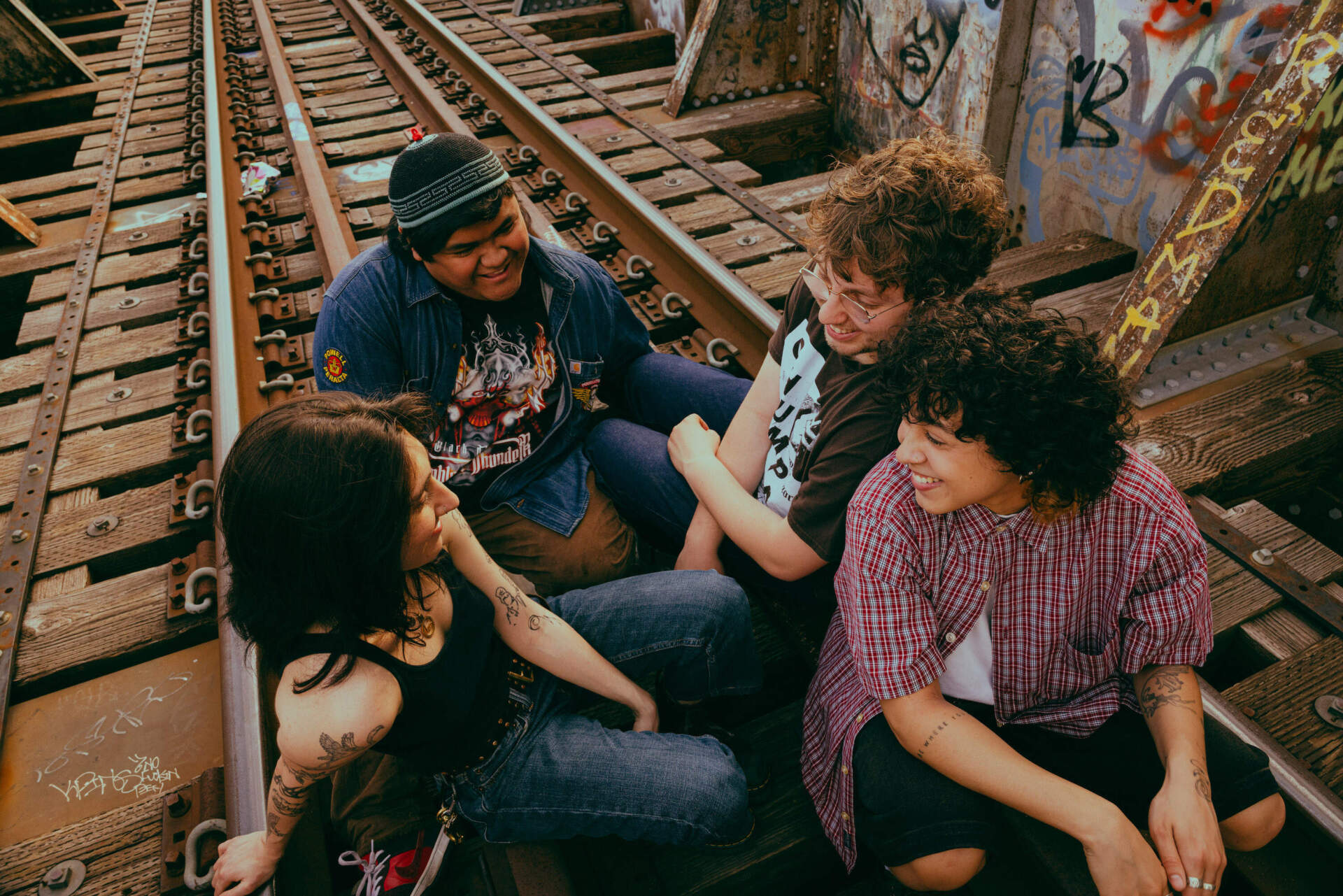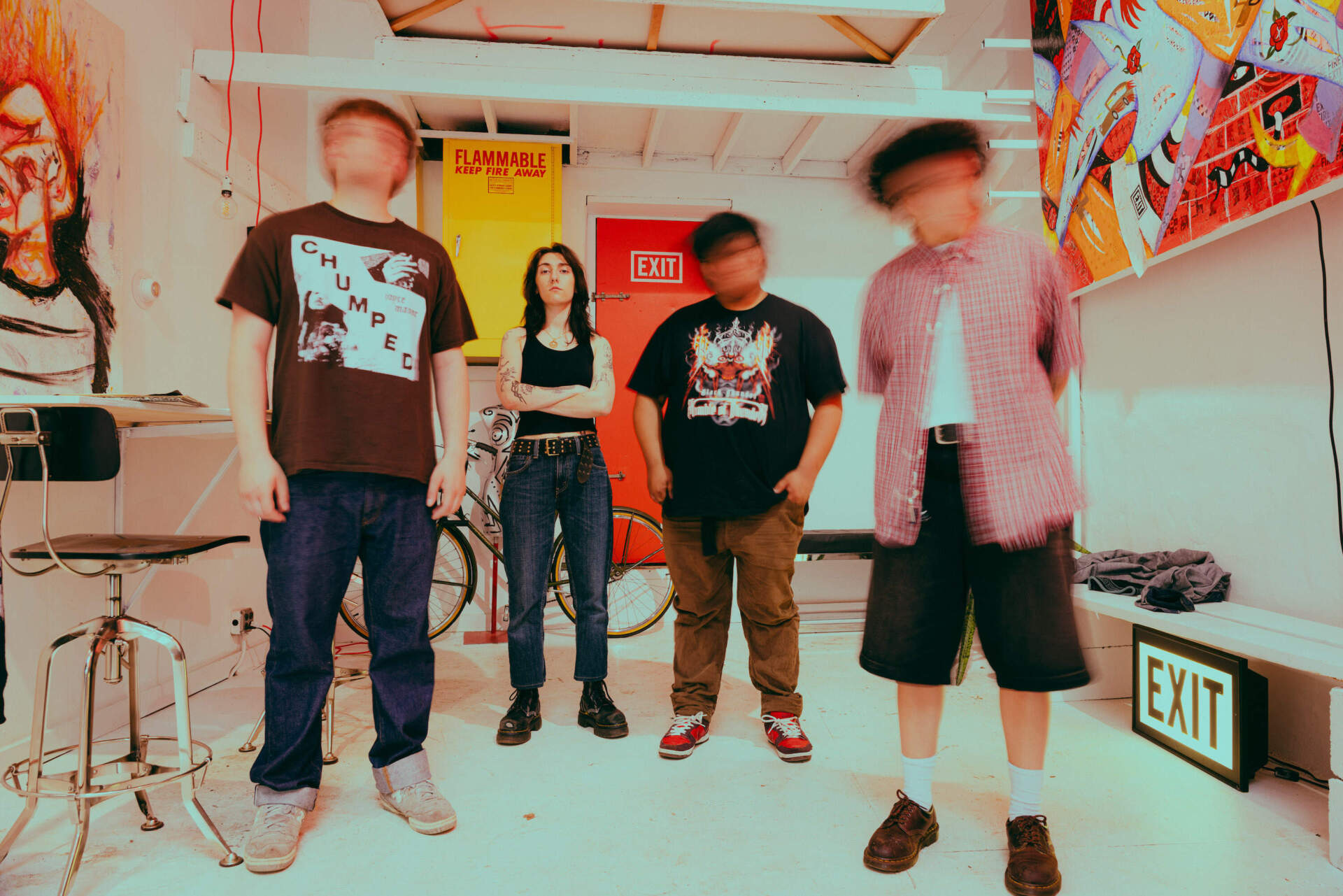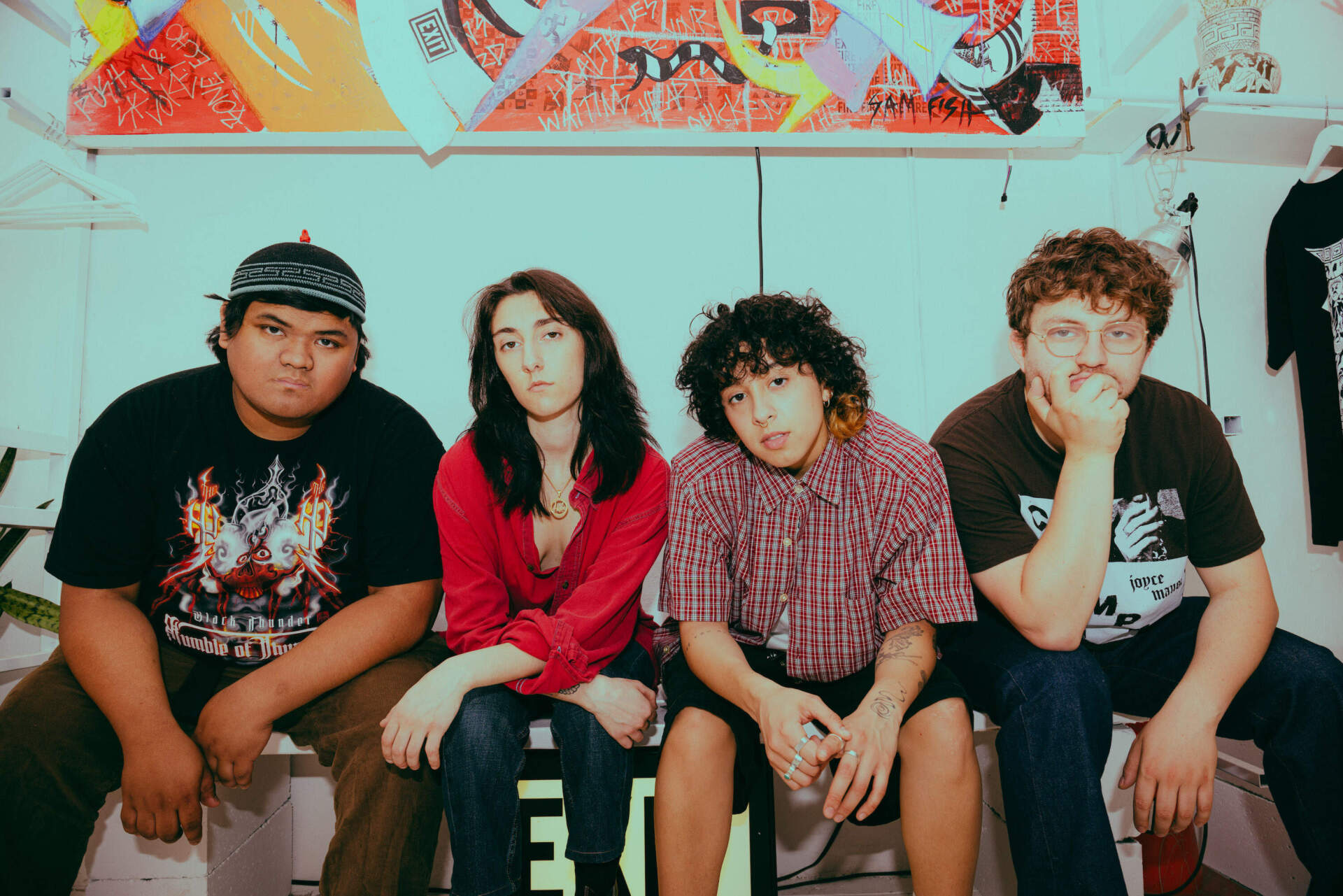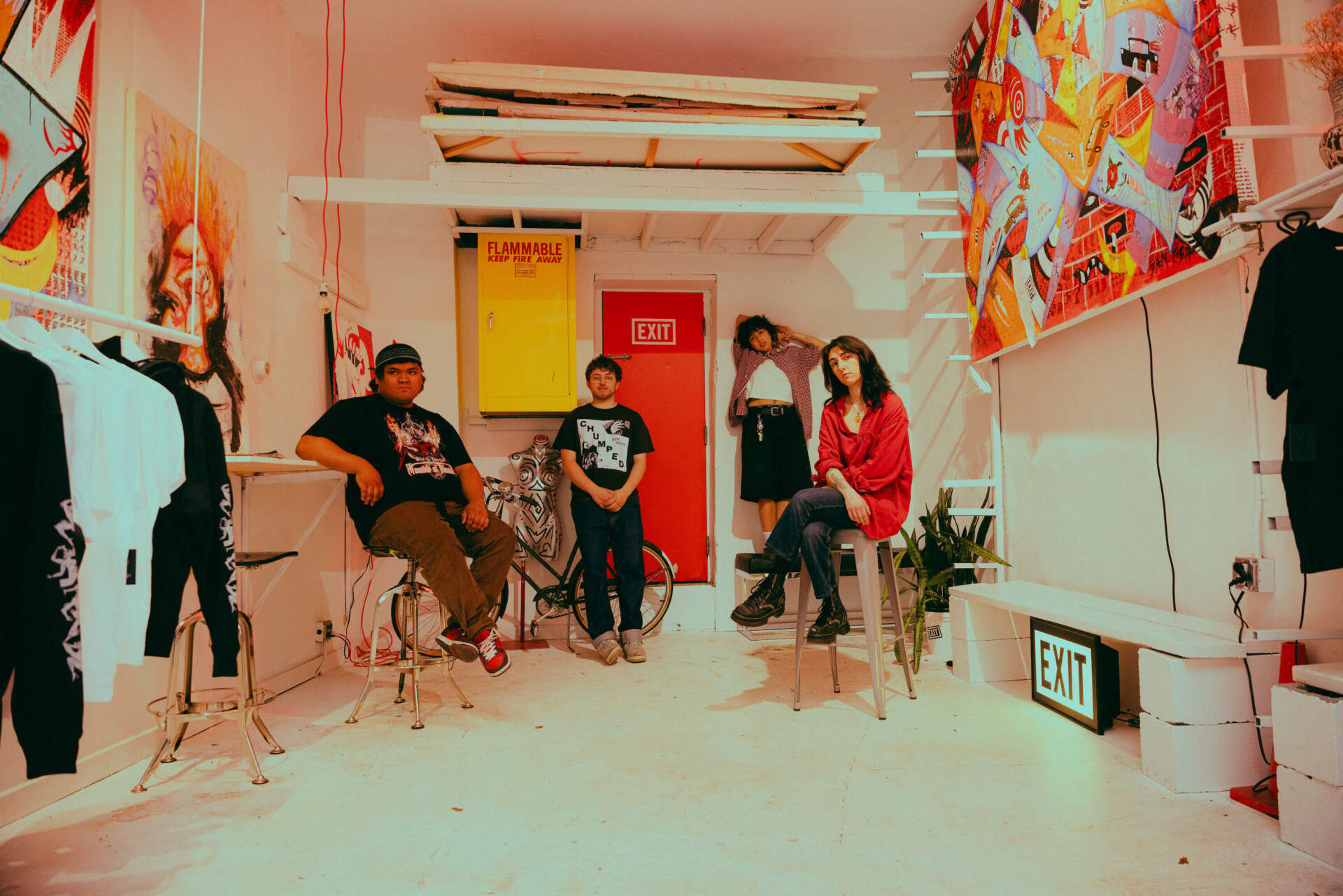
Trash Rabbit's daredevil punk rock channels grief, joy and jazz
There’s something at once mythical and endearing about a rock band who formed in high
school. A group of precocious misfits come together in some quirky way, and it feels like destiny. The Boston emo-punk band Trash Rabbit has a few origin stories that fit the bill. In one version, they started out as a Red Hot Chili Peppers cover band that for some reason also played Beastie Boys songs. Another fun fact: the group’s founding members played in the pit band for a production of “Rent” at Newton South High School. And then there was the day Mena Lemos met Nic Adams in jazz class freshman year.
“I spotted Nic playing drums,” Lemos recalled. “And I was like, Nic, you and I should play music together. And Nic didn’t really talk –”
“Because I was scared of you!” Adams interjected.
The band was sitting in Gibran Mobarak’s living room in Allston, attempting to recount said origin story. Lemos recalled that she and Mobarak went to the same middle school, “but I was in the gay clique and he was in the nerd clique, so we didn’t cross paths.” It was easy to imagine the group as they might have been back in high school: Lemos brash and fast-talking, Adams shy but happy to get roped into her schemes, Mobarak a solid presence.

There was pain, too, and loss. Punk music is great for excavating teen angst, and Trash Rabbit does it better than most. With Lemos on guitar, Adams on bass, Mobarak on drums and the recent addition of Gia Flores on guitar, they’ve honed a visceral, riff-laden sound, the kind that you can mosh to even as you belt along, Taylor Swift-style. All four musicians sing, but Lemos usually takes the lead, exuding hyped-up frontwoman energy. The music contains a touch of the daredevil, like white-knuckling your bike down the steepest hill in your suburban hometown.
Those early musical experiences in high school jazz class still exert a gravitational pull on the band, even though Trash Rabbit’s music sounds nothing like jazz. You can hear its influence in intricate licks, deft tempo changes and a comfortable relationship with dissonance. Adams in particular likes to improvise, often making up new bass lines on the spot.
“The same things I love about punk are the things that I love about jazz,” Adams said. “The creativity and the exploration and the willingness to go outside of what is expected.”
"The same things I love about punk are the things that I love about jazz. The creativity and the exploration and the willingness to go outside of what is expected."
Nic Adams
Lemos put it more bluntly: “We grew up in a hella elitist town – shout out Newton – but we didn't like school, we didn't like sports, so instead we got really good at music.”
A shared love of punk and emo music – Green Day is still a favorite – led Trash Rabbit to Boston’s basement rock scene. While still in high school, the band self-released a couple short albums, frenetic, anthemic recordings that careen from one delirious lick to the next. They even went on a small tour in Vermont. Lemos’ dad drove them.

The entire band matriculated at Berklee College of Music. Lemos and Adams studied music education, and Mobarak electronic production design – majors designed to pay the rent. But they kept up the Trash Rabbit momentum. In 2021, the trio released an EP called “Trash Rabbit Presents: Rabbit’s Rumble.” The music on “Rabbit’s Rumble” is crashy and forceful, and at times dizzyingly complex.
“You can tell from ‘Rabbit’s Rumble’ [that] we’re like, ‘music school!’” Mobarek said, laughing. “‘Let’s jazz everything up.’”
Since then, they all agree, they’ve learned to do less. (Although nothing about Trash Rabbit’s music feels like “less.”) The addition of Flores in 2022, a fellow Berklee student, added heft to the sound even as it became more streamlined. A handful of recent singles are fierce and undeniable, with a newfound lyrical directness. “They all say little kids want to grow up/ But when I was little I just wanted to stay small,” Lemos sings over the opening chords of “Rock Bottom,” a song about loss that’s as furious and yearning as grief itself. Adams celebrates their queer identity in “Ace Anthem,” a boisterous ode to asexual romance that contains cheeky lines such as “I love the way you look in my bed/ With your clothes on.” The churning breakup song “Rubberneck” turns on a dramatic slowdown and a primal scream.
Advertisement
In March, Trash Rabbit released a live album, recorded at The Record Co. studios in Boston as part of a YouTube series called Your Mom’s Basement. The session provided a chance to re-record some of the band’s earlier songs, which they removed from Spotify after deciding the quality wasn’t up to snuff. The album bottles up the head-banging abandon of a basement show, allowing Trash Rabbit to showcase the live chops that earned its reputation.

Trash Rabbit’s fanbase has steadily grown. A number of its songs on Spotify sit comfortably in the tens of thousands of streams, and the band has begun to pick up higher profile gigs, snagging opening slots at the Sinclair and Brighton Music Hall.
Flores has taken over the band’s social media accounts and built up a personable social media presence that functions as a portal into Trash Rabbit’s scrappy, exuberant performances. “The stuff that we post, even though they're not going viral, they're reaching different people every time somehow,” she said.
That slow, steady growth goes against the accepted wisdom the band encountered at Berklee, where big social media followings were viewed as markers of success. The point, said Flores, is to build a relationship with fans.
“This band has a really interesting story behind it and I think, before, maybe people didn't really know that,” she said. “These people have been through a lot.”
“‘They’re gay. They’re crazy. Their bandmate’s dead,” Lemos quipped.
It had taken almost the entirety of the interview to get to the tragedy that lurks beneath Trash Rabbit’s charming origin story: the death of the band’s original bassist from an accidental overdose in 2020. Tommy Cable was a fellow Newton South student who also went to Berklee. A falling out meant he hadn't played with Trash Rabbit since high school. But there was always this lingering hope that, one day, he might come back.
The day he died still felt vivid, a memory the band turned over in painful detail. Lemos got a call from Berklee and collapsed in the street. Mobarak’s phone rang while he was in class and he ignored it, fearing the worst. Adams remembered seeing Cable’s mom standing outside his dorm, crying.
It’s not a piece of trivia about the band they usually lead with. But it will always be part of Trash Rabbit’s story.
“The fact that we came out of it, this makes me want to push for Trash Rabbit so hard,” Mobarak said. “I'm like, okay, so we did all that and now what, now we're just gonna, like, stop?”

Trash Rabbit is not planning to stop. The band is already working up songs for its next project. Its members have all graduated. Adulthood looms: there are day jobs to be worked, rent to be paid, gigs to be booked. Lemos and Flores are planning to move to New York City. That seems like the next market for Trash Rabbit to break into.
Looking back, it was hard to believe they’d come so far. Adams remembered playing for a nearly empty room during the band’s first tour and wondering if they had made a mistake.
“I was like, ‘This is such a bad idea. I should go into business or something in college,’” Adams laughed. “It’s funny to look back on those days and be like, we were just little kids, really.”
This segment aired on June 12, 2024.
